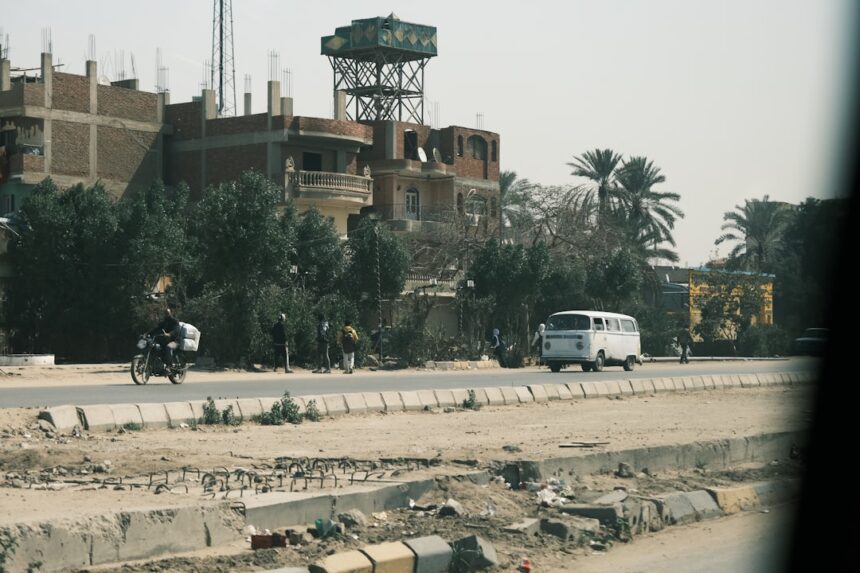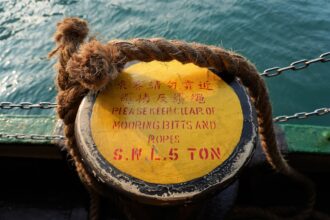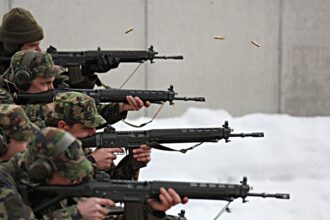Blackwater Security, founded in 1997 by former Navy SEAL Erik Prince, emerged as a prominent private military contractor in the early 21st century. Initially established to provide training and support for military and law enforcement personnel, Blackwater quickly evolved into a key player in the burgeoning private security industry. The company gained notoriety for its involvement in various conflict zones, particularly during the Iraq War, where it provided security services to U.S.
government officials, military personnel, and other entities. As the demand for private security surged in the wake of the September 11 attacks, Blackwater positioned itself as a vital resource for the U.S. government, offering a range of services that included armed protection, logistics support, and training.
The rise of Blackwater coincided with a significant shift in military operations, where the reliance on private contractors became increasingly prevalent. This transformation raised questions about accountability, oversight, and the ethical implications of outsourcing military functions to private entities. Blackwater’s operations in Iraq would soon become emblematic of these concerns, as the company navigated a complex landscape marked by violence, political instability, and the challenges of operating in a war-torn environment.
The narrative surrounding Blackwater is not merely one of security provision; it encapsulates broader themes of privatization in warfare and the evolving nature of military engagement in the 21st century.
Key Takeaways
- Blackwater Security is a private military company that gained notoriety for its controversial actions in Iraq.
- Blackwater played a significant role in providing security for U.S. officials and personnel in Iraq during the Iraq War.
- The company’s actions in Iraq, including the Nisour Square massacre, sparked international outrage and raised questions about the use of private military contractors.
- Blackwater’s presence in Iraq had a significant impact on Iraqi society, contributing to anti-American sentiment and fueling distrust of foreign security forces.
- Blackwater’s legacy in Iraq has had a lasting impact on the use of private military contractors and the way security is handled in conflict zones.
Blackwater’s Role in Iraq
In the context of the Iraq War, Blackwater’s role was multifaceted and critical to U.S. operations. The company was contracted to provide security for high-profile individuals, including diplomats and military officials, as well as to protect vital infrastructure and convoys.
As violence escalated in Iraq following the 2003 invasion, the need for robust security measures became paramount. Blackwater’s operatives were often deployed in high-risk areas where traditional military forces could not guarantee safety. Their presence allowed U.S.
officials to conduct operations with a degree of security that would have otherwise been unattainable. Blackwater’s personnel were often seen as an extension of U.S. military power, operating alongside American troops but under different rules of engagement.
This duality created a unique dynamic on the ground, where Blackwater operatives were tasked with missions that required quick decision-making and aggressive tactics. The company’s ability to mobilize rapidly and respond to threats made it an attractive option for U.S. commanders who needed immediate support in a volatile environment.
However, this reliance on private contractors also raised concerns about the implications of outsourcing security functions that were traditionally handled by military forces.
Blackwater’s Controversial Actions in Iraq

Despite its initial successes, Blackwater’s operations in Iraq were marred by controversy and allegations of misconduct. One of the most infamous incidents occurred in September 2007 when Blackwater operatives opened fire in Nisour Square, resulting in the deaths of 17 Iraqi civilians. This event sparked outrage both domestically and internationally, leading to widespread condemnation of Blackwater’s tactics and raising questions about the accountability of private military contractors.
The incident highlighted the potential for excessive use of force and the lack of oversight that often accompanied private security operations. In the aftermath of the Nisour Square shooting, investigations revealed a pattern of aggressive behavior among Blackwater personnel, including instances of unprovoked attacks on civilians and reckless driving. These actions not only tarnished Blackwater’s reputation but also fueled anti-American sentiment among Iraqis who viewed the company as emblematic of foreign aggression and disregard for local lives.
The controversy surrounding Blackwater’s conduct underscored the challenges of operating in a complex conflict environment where the lines between combatants and non-combatants were often blurred.
Blackwater’s Impact on Iraqi Society
| Impact on Iraqi Society | Metrics |
|---|---|
| Security | Increased violence and instability |
| Economy | Displacement of local businesses |
| Public Trust | Erosion of trust in foreign contractors |
| Legal System | Controversy over legal immunity for Blackwater employees |
The presence of Blackwater in Iraq had profound implications for Iraqi society, shaping perceptions of foreign intervention and complicating the relationship between local populations and U.S. forces. Many Iraqis viewed Blackwater operatives with suspicion and resentment, perceiving them as mercenaries who operated outside the bounds of international law.
This perception was exacerbated by incidents of violence involving Blackwater personnel, which contributed to a growing sense of alienation among Iraqis who felt that their lives were expendable in the eyes of foreign contractors. Moreover, Blackwater’s operations contributed to a climate of fear and instability within Iraqi communities. The aggressive tactics employed by some operatives fostered an environment where civilians felt threatened rather than protected.
As a result, trust between local populations and U.S. forces eroded, complicating efforts to stabilize the country and rebuild after years of conflict. The legacy of Blackwater’s actions continues to resonate in Iraq today, as many citizens grapple with the long-term consequences of foreign military involvement and the role that private contractors played in shaping their experiences during the war.
Blackwater’s influence on U.S. military operations in Iraq extended beyond its immediate security functions; it also shaped broader strategic considerations regarding the use of private contractors in warfare. The company’s ability to provide rapid response capabilities allowed military commanders to focus on larger operational objectives without being bogged down by security concerns for their personnel.
This shift towards privatization reflected a growing trend within the U.S. military to outsource certain functions to enhance efficiency and flexibility. However, this reliance on private contractors also raised critical questions about command authority and accountability on the battlefield.
The blurred lines between military personnel and private contractors complicated operational coordination and raised concerns about adherence to rules of engagement.
S.
strategies in subsequent conflicts.
Blackwater’s Role in Diplomatic Security in Iraq
In addition to its security operations for military personnel, Blackwater played a crucial role in providing diplomatic security for U.S. officials stationed in Iraq. As violence surged during the insurgency, ensuring the safety of diplomats became paramount for maintaining U.S.
interests in the region. Blackwater was tasked with protecting embassies, consulates, and other diplomatic missions, often operating in high-threat environments where traditional security measures were insufficient. The company’s involvement in diplomatic security underscored its significance as a key player in U.S.
foreign policy implementation during a tumultuous period. However, this role also raised ethical questions about the privatization of diplomatic protection and the potential consequences for international relations. Incidents involving Blackwater operatives not only jeopardized individual missions but also had broader implications for U.S.-Iraqi relations, as local populations reacted to perceived violations of sovereignty and human rights.
Blackwater’s Legal Issues in Iraq

The legal challenges faced by Blackwater in Iraq were emblematic of the complexities surrounding private military contracting during wartime. Following the Nisour Square incident, legal proceedings ensued that highlighted significant gaps in accountability for private contractors operating in conflict zones. While U.S. military personnel were subject to military law under the Uniform Code of Military Justice (UCMJ), private contractors like those employed by Blackwater often fell into a legal gray area that complicated efforts to hold them accountable for their actions. The legal ramifications extended beyond individual cases; they prompted discussions about the need for clearer regulations governing private military contractors operating abroad. As public outrage mounted over incidents involving Blackwater personnel, lawmakers began to scrutinize existing frameworks that allowed private firms to operate with relative impunity. The legal battles faced by Blackwater would ultimately contribute to calls for reform within the industry and greater oversight of private military contracting practices.
Blackwater’s Legacy in Iraq
Blackwater’s legacy in Iraq is one marked by both significant contributions to security efforts and deep-seated controversies that continue to shape perceptions of private military contractors today. While the company provided essential services that enabled U.S. operations during a critical period, its actions also sparked debates about ethics, accountability, and the role of privatization in modern warfare.
The events surrounding Blackwater serve as cautionary tales about the potential consequences of outsourcing military functions to private entities without adequate oversight. As Iraq continues to navigate its post-war landscape, the impact of Blackwater’s presence remains palpable. Many Iraqis still associate foreign contractors with violence and exploitation, complicating efforts to rebuild trust between local communities and international actors.
The legacy of Blackwater serves as a reminder of the complexities inherent in modern conflict and underscores the need for thoughtful consideration of how security is provided in volatile environments.
Blackwater’s Impact on Private Military Contractors in Iraq
The rise and fall of Blackwater had far-reaching implications for the broader landscape of private military contracting in Iraq and beyond. As one of the first major firms to gain prominence during the Iraq War, Blackwater set a precedent for how private contractors could operate within conflict zones. Its experiences influenced other companies seeking contracts with governments around the world, shaping industry standards and practices.
However, Blackwater’s controversies also prompted increased scrutiny of private military contractors as a whole. Following high-profile incidents involving misconduct or violence, governments began to reassess their relationships with these firms and implement stricter regulations governing their operations. The lessons learned from Blackwater’s experiences would ultimately inform discussions about accountability, oversight, and ethical considerations within the private security industry.
Blackwater’s Contribution to Security in Iraq
Despite its controversial reputation, it is essential to acknowledge that Blackwater made tangible contributions to security efforts during its time in Iraq. The company’s ability to provide rapid response capabilities allowed U.S. forces to operate more effectively in high-threat environments where traditional military resources were stretched thin.
By offering armed protection for diplomats and critical infrastructure, Blackwater played a role in facilitating essential operations that supported U.S. interests during a tumultuous period. Moreover, Blackwater’s presence highlighted the evolving nature of security provision in modern warfare, where traditional military forces are increasingly supplemented by private contractors capable of delivering specialized services quickly and efficiently.
While this shift raises important ethical questions about accountability and oversight, it also reflects broader trends within contemporary conflict dynamics that continue to shape how nations approach security challenges.
Blackwater’s Future in Iraq
As Iraq continues its journey toward stability and reconstruction, questions remain about the future role of private military contractors like Blackwater within its borders. While some argue that such firms can provide valuable expertise and support during transitional periods, others caution against repeating past mistakes that led to violence and mistrust among local populations. The future landscape for private military contracting will likely depend on evolving regulations governing their operations and increased scrutiny from both governments and civil society organizations advocating for accountability and transparency.
As nations grapple with complex security challenges worldwide, understanding the lessons learned from Blackwater’s experiences will be crucial for shaping responsible approaches to privatized security solutions moving forward. In conclusion, Blackwater Security’s involvement in Iraq serves as a microcosm of broader debates surrounding privatization in warfare and its implications for international relations, ethics, and accountability within conflict zones. The company’s legacy is one marked by both significant contributions to security efforts and deep-seated controversies that continue to resonate today.
In the complex landscape of private military companies operating in conflict zones, Blackwater’s role in Iraq has been a subject of intense scrutiny and debate. The company’s involvement in various incidents has raised questions about accountability and the ethical implications of using private security firms in military operations. For a deeper understanding of the intricacies surrounding Blackwater’s operations and the broader implications for private military contractors, you can explore a related article on this topic by visiting In The War Room. This resource provides valuable insights into the challenges and controversies faced by private security firms in conflict areas like Iraq.
WATCH THIS! From Tehran to Blackwater: The Real Story
FAQs
What is Blackwater security?
Blackwater security is a private military company that provides security, training, and logistics support to government and commercial clients. It was founded in 1997 and gained attention for its work in Iraq.
What role did Blackwater security play in Iraq?
Blackwater security played a significant role in Iraq, providing security services to various clients, including the United States government and private companies operating in the region.
What controversies has Blackwater security been involved in?
Blackwater security has been involved in several controversies, including the 2007 Nisour Square massacre in Baghdad, where its employees were accused of killing 17 Iraqi civilians. This incident sparked international outrage and raised questions about the use of private military contractors in conflict zones.
How has Blackwater security been affected by these controversies?
As a result of the Nisour Square massacre and other controversies, Blackwater security faced legal and public relations challenges. The company rebranded itself as “Academi” in 2011 and has since undergone changes in ownership and leadership.
What is the current status of Blackwater security in Iraq?
As of the present, Blackwater security, now known as Academi, continues to provide security and training services globally, but its operations in Iraq have been significantly impacted by the controversies and legal challenges it has faced.




